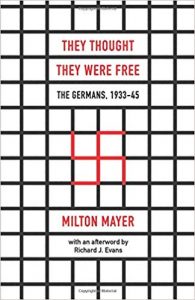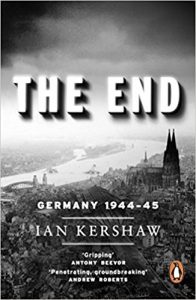They Thought They Were Free: The Germans, 1933–45
by Milton Mayer
With a New Afterword by Richard J. Evans
The University of Chicago press, Chicago and London, 2017
pp. 390
The End: Hitler’s Germany, 1944-45
by Ian Kershaw (Author)
Penguin Books, London, 2012
pp. 592
- They Thought They Were Free: The Germans, 1933–45
by Milton Mayer
With a New Afterword by Richard J. Evans
The University of Chicago press, Chicago and London, 2017
pp. 390

“WE HAD NO TIME TO THINK.” GERMANY 1933-1945
We cannot afford not to understand it, but Nazi Germany (1933- 1945) has always puzzled its historians. How could so many of such a civilized and well educated people as the Germans believe in Nazism? Initially most of these historians were outsiders, so the characteristics and the practice of Nazism, with at its depth the extermination of the Jews, struck them with full force. But inside Germany at the time, its full range did not become clear at one stroke. (And the ideology itself also evolved.) People got accustomed to it, in small steps. Most of these steps did not seem much. And one must eat, pass examinations, get a job, get married. They found themselves just normal, small people in a normal, small German town.
Milton Mayer did most of his research by living in such a small German town in 1952, where he made friends, whose stories he told. For some, but certainly not all, it was clear that, sure, things had gone unacceptably out of hand. But then, “[H]ow easy it was, then, not to think about fundamental things. One had no time.” There always was a new crisis, a new success, a new reform. It was “the gradual habituation of the people, little by little, to being governed by surprise, to receive decisions deliberated in secret … And all these crises and reforms (real reforms, too) so occupied the people that they did not see the slow motion underneath . . .” (pp. 166-67)
Most of his informants remembered the Hitler years as the time of their life. They passed examinations, got a job, got promotions, got married. And the political meetings had been exciting. There were always more of them. “There was so much going on.”
It would be their children, who from about 1964 realised what their parents had done. But this book is published in 1955, halfway between the defeat of Germany and the new generation.
In line with the war propaganda on both sides, the Second World War has been projected as the struggle between good and evil. It was. The evil at least was clear.
It was not all though, and we need to understand not only how, but also into what that evil was embedded. Given the epic proportions of the ideological struggle, Milton Mayer came to an amazingly humane and nuanced conclusion. He dedicated his book to his “Nazi friends”. “My faith (he was Jewish) found that [spark] of God in my ten Nazi friends, My newspaper training found that of something else in them, too. They were each of them a most marvelous mixture of good and bad impulses, their lives a marvelous mixture of good and bad acts, I liked them. I could not help it.” (p. viii)
A real insight into this period.
Published 29 July 2018.
https://www.amazon.co.uk/gp/customer-reviews/R2DIPSQ4OZHFTM?ref=pf_ov_at_pdctrvw_srp
- The End: Hitler’s Germany, 1944-45
by Ian Kershaw (Author)
Penguin Books, London, 2012
pp. 592

GERMANY’S DEFEAT: NOT A SYSTEMS COLLAPSE
Does this ring a bell?It was all lost. Enemy forces, drunk with revenge for the destruction of their country, were approaching the capital from one side. Another enemy advanced from the other side, daily bombarding all strategic – and many times civilian – targets to break the spirit of resistance. In his bunker, the ageing dictator heard the rumbles of war getting closer. They were out for him, and nothing but unconditional surrender could stop them.
In the long run, but outside the scope of this book, the German people would try to cleanse themselves by hard work (Wirtschaftswunder) and it was their children who took them to account, as witness among other developments the student rebellion of the 1960s. It took the Germans even longer to convince their neighbours, as there was sporadic mistrust even during the German unification of 1990. Of course, now very few if anybody doubts Germany’s credentials as a democratic state.
The war and especially its last ten months had shown the paralysis of the German elite and the automatic response of its population to authority. It is Kershaw’s achievement to show the depths from which the democratic spirit in Germany had to rise. He has done so by sticking to the facts and without wagging the moral finger. I recommend the book.
Published 3 September 2012
https://www.amazon.co.uk/gp/customer-reviews/R1XTIEBWFEO17L?ref=pf_ov_at_pdctrvw_srp
